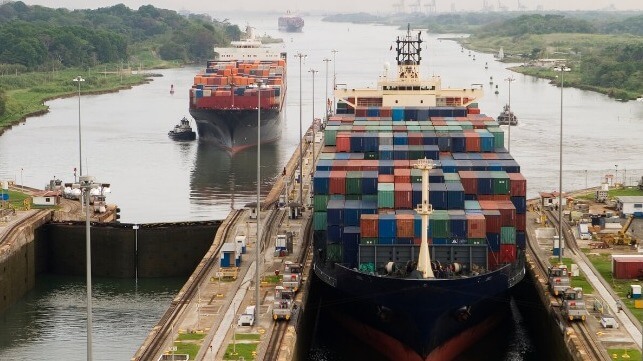How Does the Panama Canal Slowdown Affect Shipping Contracts?

The climate crisis is having a drastic effect on the shipping industry. In this article, Beth Bradley, Colin Lavelle and Reema Shour of law firm Hill Dickinson discuss the impact of the Panama Canal drought on the cargo and logistics supply chain. They explore how the climate crisis is worsening challenges facing the sector and share advice on what businesses must know when it comes to their contractual rights and climate-induced trade difficulties.
Drought in the Panama Canal
The Panama Canal significantly reduces the time and distance for vessels to travel between the Atlantic and Pacific oceans. It normally operates all year round, 24 hours a day, and statistics show that about 13,000 to 14,000 vessels cross the Canal annually.
However, the region has recently been suffering from its worst drought for over 70 years. As a result, and for the first time ever, the Panama Canal Authority has had to limit the number of vessels crossing the Canal. The usual average is about 36 vessels per day. This was reduced to roughly 32 in June 2023 and, as of November 2023, the number is down to only 25. It is expected that this number will be further reduced to 18 slots a day from February 2024.
As well as this, the Authority has also had to reduce the draft limit from 50ft to 44ft. This imposes a limit on the size of a ship which can pass through the canal, and as a result, the amount of cargo that passes through.
Logistical impact
With the situation worsening, vessels are having to wait much longer than normal before they can pass through the Canal. The delays caused have impacted the wider global supply chain and already increased costs as a result.
The delays are pushing shipping rates upwards in other regions, with fewer vessels being available for longer routes. Nonetheless, some shipping companies are opting to avoid the delays by taking those longer routes around the Cape of Good Hope, Cape Horn and the Suez Canal. Or they are spreading cargoes across multiple vessels in order to meet reduced draft limits.
While vessels without pre-booked slots to cross the Canal are being turned away, some parties are looking to bid for expedited transit slots with booking slots reportedly being auctioned at record prices. One booking slot was reportedly auctioned for US$3.95 million for an LPG carrier scheduled to make a northbound transit from the Pacific to the Atlantic on 15 November 2023.
Legal contracts: what you need to know
Charterparties and contracts of affreightment may be impacted by these delays. It is recommended to carefully consider the potential implications of the canal delays on existing or upcoming agreements, particularly for those negotiating future contracts.
In light of this, it is important to identify the allocation of risk under the contract for any delays and associated costs. Shipping clauses dealing with delay, detention of the vessel and demurrage should be reviewed carefully, as should any force majeure, Stoppage of Canals and Waterways clauses or similar.
The scope and effect of these clauses will depend on the law that governs the contract. For example, in English law, it is unlikely the concept of frustration will be available as it is usually necessary to demonstrate performance of the contract has become impossible. This is different to a situation where performance can take place, even if it is severely delayed or becomes much more expensive.
Sales contracts can also be impacted by these delays. For these, it is important to consider who is responsible for additional costs associated with the carriage, and whether these costs can be passed up or down the contractual chain. Consideration should also be given to what the demurrage provisions say, and whether time is of the essence in delivering the goods.
Preparing for the future
With the climate crisis not going away anytime soon, it is important to learn how to adapt and prepare for the ongoing threats it presents to trade routes and businesses involved.
If necessary, it is recommended that affected parties seek legal advice to understand in full their rights and responsibilities under their contracts, both now and in the future. This will ensure that from a legal standpoint, businesses are as prepared as possible for further impacts of climate change.
Beth Bradley is a partner at Hill Dickinson and has a notable dispute resolution practice within the shipping sector. She is recommended for shipping in London as a leading individual and Next Generation partner by Legal 500 and ranked by Chambers & Partners 2025.

that matters most
Get the latest maritime news delivered to your inbox daily.
Colin Lavelle is a partner in the shipping team at Hill Dickinson, with both commercial and contentious expertise. This includes ship arrest, contractual disputes, cargo claims, personal injury, ship sale and purchase, and advising on terms and conditions.
Reema Shour is a senior knowledge lawyer in the global shipping team. Her expertise covers both "dry" and "wet" shipping, trade and commodities, marine insurance and dispute resolution.
The opinions expressed herein are the author's and not necessarily those of The Maritime Executive.
